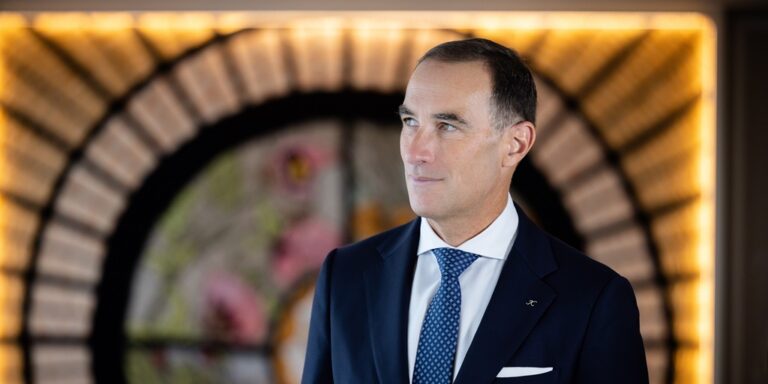Afshin Kateb is an experienced real estate and finance executive and so provided his expert insight on the prevailing market headwinds and tailwinds.
Why did you decide to join Palladius and what are your aims for your new role?
Palladius takes a surgical approach to investing, which aligns with how I’m used to operating. I’m focused on leveraging my experience and relationships – which I’ve cultivated over the course of my 25-year career at KOR Group, SBE, and Nimes –to accelerate the firm’s growth. Creating a best-in-class organisational reporting, finance and investment management function is our mantra, and I will be an integral part of that vision and mission.
Can you give an example of a current Palladius hotel investment?
While we don’t currently own any hotels in our portfolio, we are hawkishly monitoring assets in key markets to take advantage of any dislocation as a result of volatility in the debt markets. It’s important to note that our Palladius Income Fund has a very robust pipeline of hotel debt. This vehicle is filling a gap for illiquidity in the market for many borrowers with great assets that are continuing to stabilise and managing to regain their value, which was impacted during the pandemic.
As with our multifamily and student housing strategies at Palladius, we are very data-driven in our underwriting approach, looking at economic drivers, demographics, diversity in demand and industry composition and concentration. Furthermore, our differentiated capabilities in asset management, project management, revenue and channel management give us domain expertise and enables us to bring immediate hands-on value to the table for our investors.
What criteria does the company use to identify potential acquisitions?
We have strict investment criteria and generally target acquiring assets in the top-25 markets at a meaningful discount to replacement cost with strong value-add potential in re-management, re-branding, operational repositioning and margin optimisation. We are seeking assets ranging from 120-300 keys in the markets that are under-indexing to the competition, capital starved, and possibly mis-branded. This asset profile produces the best candidates for our hands-on asset management approach which allows us to meaningfully grow net operating income through a combination of value add renovation, revenue mix optimisation (group, leisure and business traveller) and expense recalibration.
How do you see the current health of the US hotel investment market?
A combination of record-high inflation, rising interest rates and geopolitical issues has reduced business visibility in the short-term. However, during inflationary periods, hotels are known to be a strong defensive asset as they can adjust their rates daily to yield higher room margin and greater revenue.
Overall, we are cautiously optimistic. The industry has shown its resilience and it is recovering from the most devastating market event in recent history. This patient went from triage to the ICU and is now in a recovery ward. The industry has not fully healed, but its long-term outlook is strong.
The headwinds and tailwinds to consider include:
Headwinds
o Volatility in capital markets and debt markets mispricing risk
o Continued recessionary pressure and its impact on the leisure traveller
o Inflationary pressure on labour and operating cost margins and its ultimate impact on values
o Slow recovery of office occupancy and its adverse impact on business travel
o Approximately $10 billion in hotel securitised debt matures over the next two years (2023 and 2024)
Tailwinds
o Continued performance acceleration in top 25 markets (although some markets such as San Francisco, Washington DC and New York City are still below 2019)
o According to American Express Travel, group meetings and events are back and don’t show any sign of weakness followed by the gradual come back of the corporate traveller
o Opportunity to buy at a discount to replacement cost due to continued increases in construction costs
o Low and limited new supply pipeline with no pressure on demand
o Deals with assumable lower rate debt in desirable markets are highly sought after
Which regions do you see as being most promising for hotel development?
The most promising markets for hotel development are those that are currently outperforming their 2019 revenue per available room (RevPAR) levels, including San Diego, Phoenix, Orange County and Tampa.
Which market segments are currently the most popular for investment?
Select drive-to leisure destinations have achieved a level of prominence and, so long as leisure demand remains strong, those markets will become stronger candidates for development. As a product, the select service sector remains the darling of the industry, as these hotels can easily manage margins and are better equipped to navigate changing operating conditions.
How do you choose which suppliers to partner with for hotel capital improvement projects?
The pandemic taught us a very important lesson regarding supplier partnerships. A partner needs to have source diversity and the ability to deliver consistent product from multiple countries. Long delays and the inability to get required product have simultaneously disrupted many planned renovations and impacted revenue stream in many hotels. Source diversity is key.
What hotel improvement projects are Palladius currently involved in?
Due to the state of the debt landscape right now the transaction markets have been comparatively quiet. Even under these conditions, we have maintained a very robust pipeline and will continue to closely examine hotels with the right value position and return potential for our investors.
What are the biggest current barriers to hotel investment?
The combination of uncertainty in debt markets and the potential for a synthetic recession is the biggest threat and barrier to hotel investment.
How do you think the US hotel development market will progress over the coming years?
GDP and RevPAR growth are closely aligned and, if 2023 experiences a mild recession as predicted by CBRE, then the ensuing demand growth trajectory in 2024 and beyond will be favourable for the industry. This demand growth is further strengthened by a few shifting fundamentals, including a muted supply pipeline created by skyrocketing construction costs and restricted development financing options.






